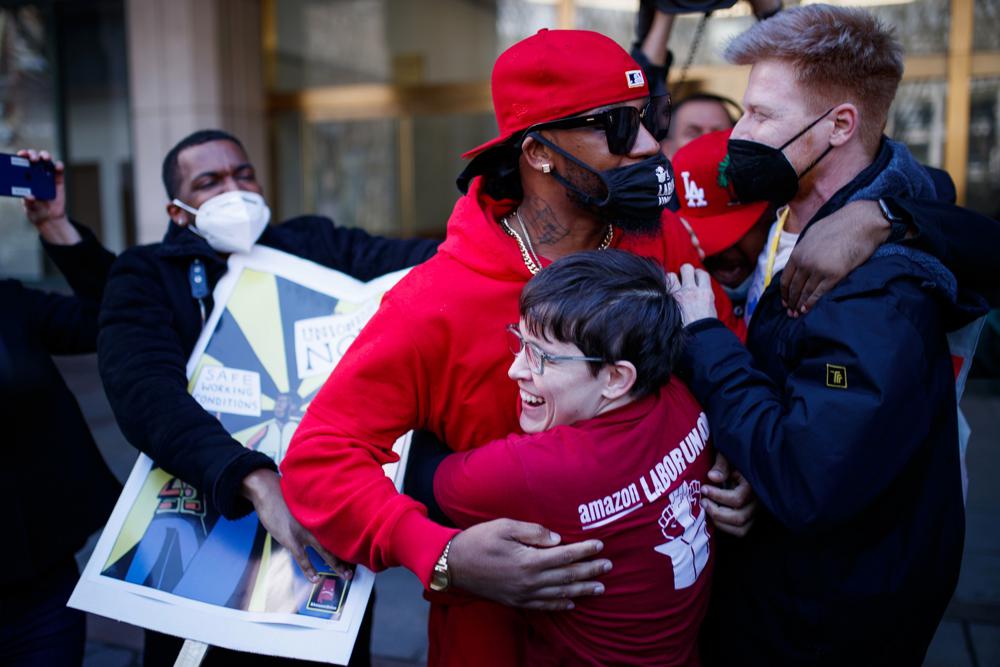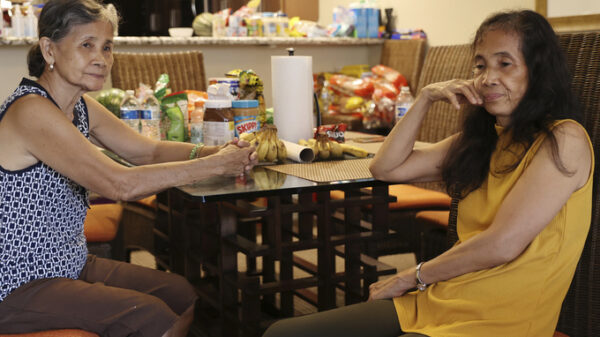FILE – Staten Island-based Amazon.com Inc distribution center union organizer Chris Smalls, center, wearing baseball cap, celebrates with union members after getting the voting results to unionize workers at the Amazon warehouse on Staten Island, in New York, Friday, April 1, 2022. (AP Photo/Eduardo Munoz Alvarez, File)
NEW YORK (AP) — When a scrappy group of former and current warehouse workers on Staten Island, New York went head-to-head with Amazon in a union election, many compared it to a David and Goliath battle.
David won. And the stunning upset on Friday brought sudden exposure to the organizers and worker advocates who realized victory for the nascent Amazon Labor Union when so many other more established labor groups had failed before them, including most recently in Bessemer, Alabama.
Initial results in that election show the Retail, Wholesale and Department Store Union down by 118 votes, with the majority of Amazon warehouse workers in Bessemer rejecting a bid to form a union. The final outcome is still up in the air with 416 outstanding challenged ballots hanging in the balance. A hearing to review the ballots is expected to begin in the coming weeks.
Chris Smalls, a fired Amazon worker who heads the ALU, has been critical of the RWDSU’s campaign, saying it didn’t have enough local support. Instead, he chose an independent path, believing workers organizing themselves would be more effective and undercut Amazon’s narrative that “third party” groups were driving union efforts.
“They were not perceived as outsiders, so that’s important,” said Ruth Milkman, a sociologist of labor and labor movements at the City University of New York.
While the odds were stacked against both union drives, with organizers facing off against a deep-pocketed retailer with an uninterrupted track record of keeping unions out of its U.S. operations, ALU was decidedly underfunded and understaffed compared with the RWDSU. Smalls said as of early March, ALU had raised and spent about $100,000 and was operating on a week-to-week budget. The group doesn’t have its own office space, and was relying on community groups and two unions to lend a hand. Legal help came from a lawyer offering pro-bono assistance.
Meanwhile, Amazon exercised all its might to fend off the organizing efforts, routinely holding mandatory meetings with workers to argue why unions are a bad idea. In a filing released last week, the company disclosed it spent about $4.2 million last year on labor consultants, who organizers say Amazon hired to persuade workers not to unionize.
Outmatched financially, Smalls and others relied on their ability to reach workers more personally by making TikTok videos, giving out free marijuana and holding barbecues and cookouts. A few weeks before the election, Smalls’ aunt cooked up soul food for a union potluck, including macaroni and cheese, collard greens, ham and baked chicken. Another pro-union worker got her neighbor to prepare Jollof rice, a West African dish organizers believed would help them make inroads with immigrant employees at the warehouse.
Kate Andrias, professor of law at Columbia University and an expert in labor law, noted a successful union — whether it is local or national — always has to be built by the workers themselves.
“This was a clearer illustration of this,” Andrias said. “The workers did this on their own.”
Amazon’s own missteps may have also contributed to the election outcome on Staten Island. Bert Flickinger III, a managing director at the consulting firm Strategic Resource Group, said derogatory comments by a company executive leaked from an internal meeting calling Smalls “not smart or articulate” and wanting to make him “the face of the entire union/organizing movement” backfired.
“It came out as condescending and it helped to galvanize workers,” said Flickinger, who consults with big labor unions.
In another example, Smalls and two organizers were arrested in February after authorities got a complaint about him trespassing at the Staten Island warehouse. The ALU used the arrests to its advantage days before the union election, teaming up with an art collective to project “THEY ARRESTED YOUR CO-WORKERS” in white letters on top of the warehouse. “THEY FIRED SOMEONE YOU KNOW,” another projection said.
“A lot of workers that were on the fence, or even against the union, flipped because of that situation,” Smalls said.
Experts note it’s difficult to know how much of ALU’s grassroots nature contributed to its victory when compared with the RWDSU. Unlike New York, Alabama is a right-to-work state that prohibits a company and a union from signing a contract that requires workers to pay dues to the union that represents them.
There was also a grassroots element to the union drive in Bessemer, which began when a group of Amazon workers there approached the RWDSU about organizing.
At a virtual press conference Thursday held by the RWDSU following the preliminary results in Alabama, president Stuart Appelbaum said he believed the election in New York benefited because it was held in a union-friendly state and Amazon workers on Staten Island voted in person, not by mail as was done in Alabama.
Despite some friction between the two labor groups in the leadup to the elections, both have adopted a friendlier public relationship in the past few days. Appelbaum praised Smalls during Thursday’s press conference, calling him a “charismatic, smart, dedicated leader.” Likewise, Smalls offered the RWDSU words of encouragement after their initial election loss.
For now, ALU is focusing on its win. Organizers say Amazon workers from more than 20 states have reached out to them to ask about organizing their warehouses. But they have their hands full with their own warehouse, and a neighboring facility slated to have a separate union election later this month.
Organizers are also preparing for a challenging negotiation process for a labor contract. The group has demanded Amazon officials to come to the table in early May. But experts say the retail giant, which has signaled plans to challenge the election results, will likely drag its feet.
“The number one thing is going to be fighting for the contract,” Smalls said. “We have to start that process right away because we know the longer drawn out the contract is, workers will lose hope and interest.”
Meanwhile, some workers are waiting to see what happens.
Tinea Greenway, a warehouse worker from Brooklyn, said before the election, she felt pressured by the messages she kept hearing both from Amazon and ALU organizers, and just wanted to make the decision herself. When the time came, she voted against the union because of a bad experience she’s had in the past with another union who she says didn’t fight for her.
“They won,” she said of the ALU. “So let’s see if they live up to the agreement of what they said they were going to do.”
Copyright 2021 Associated Press. All rights reserved.





























